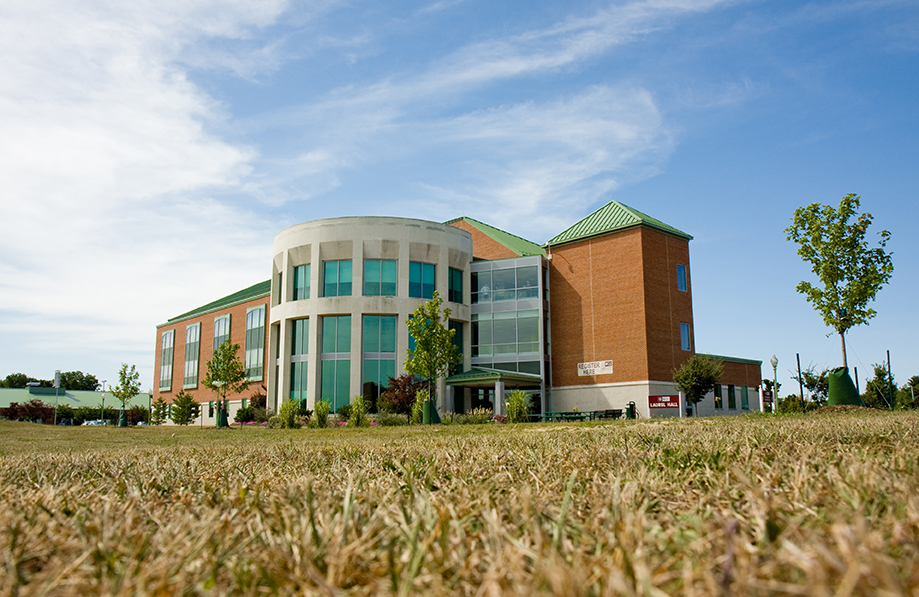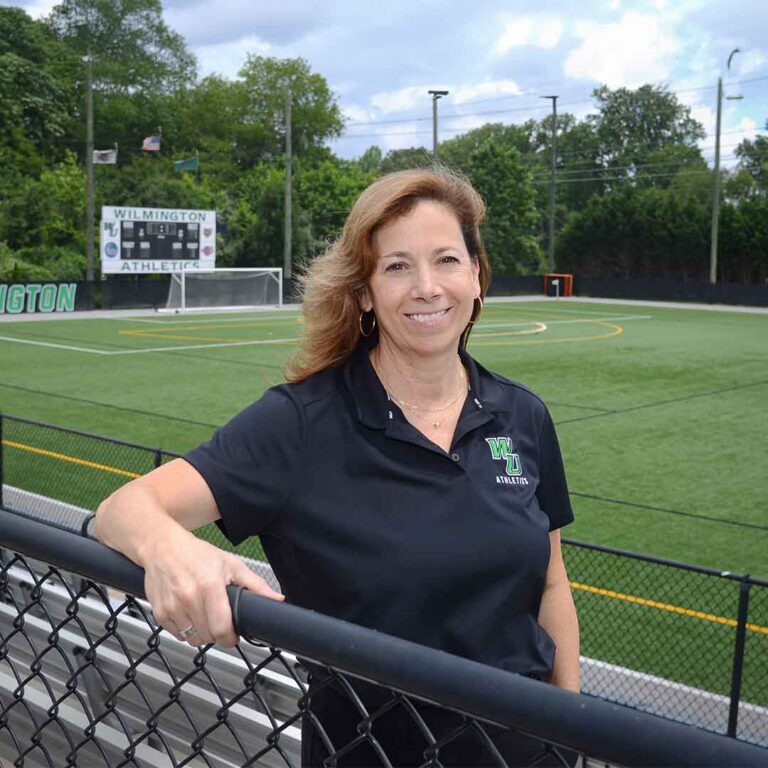Joint Efforts In Jersey

Wilmington University’s partnerships with community colleges in southern New Jersey build bridges to academic success.

For Madison Humphries, learning and earning go hand in hand.
“My mom always pushed me to stay busy,” she says. “I held small part-time jobs throughout high school and as I was starting my college career.”
After completing an associate degree at Rowan College at Burlington County (RCBC) in Mount Laurel, New Jersey, she set her sights on building it into a bachelor’s in Behavioral Science. However, any degree completion program she transferred into would have to satisfy two requirements.
“I lived at home while earning my associate degree, and I was looking to do the same for my bachelor’s degree,” says Humphries, who lives in Maple Shade, New Jersey. “Also, it was important that I was able to have a flexible schedule, in order to work.”
Wilmington University met both of her needs, thanks to a unique agreement it forged with RCBC. “WilmU’s classes were offered right on the Mount Laurel campus, in the evening, which made it extremely easy to manage both my education and my work life,” she says. “It allowed me to gain a distinguished degree while also saving money. Win-win situation.”
She’s one of thousands of South Jersey residents who have taken advantage of Wilmington University’s academic partnerships with the region’s community colleges. Since 2007, these partnerships have brought WilmU’s student-focused, career-oriented educational opportunities across the river to the Garden State.
Sharing the Mission
At RCBC and Cumberland County College in Vineland, at Salem Community College in Carneys Point, and Rowan College at Gloucester County in Sewell, WilmU is expanding the region’s educational options, enabling college students and working professionals to achieve their educational goals in South Jersey. It has, over the past 11 years, empowered more than 2,050 residents of the state to earn a bachelor’s or graduate level degree.

The partnerships have been “an opportunity for Wilmington University to share our way of providing higher education with others,” says Dr. Jim Wilson, the school’s vice president of Academic Affairs. “We’re extending our mission to students in New Jersey.”
The “Wilmington University way” offers degree and certificate programs, taught by real-world-experienced professionals in flexible course formats. They prepare undergraduate, graduate and mid-career students for their futures while fitting into budgets and schedules.
Academic partnerships with New Jersey community colleges build on those advantages, starting with direct transfer agreements that save students time and money. With the ability to apply the credits they’ve earned in the course of their associate degrees toward studies in related fields at WilmU, they’re within easy reach of a bachelor’s degree.
“The community colleges have developed many partnership agreements, so we’re in competition with a good many schools,” says Louise Babuschak, senior director of WilmU’s New Jersey sites. But among students, “our affordability and the ease of our seamless transfers usually win out over competing options.”
Continuing their education locally is another benefit. In many cases, students can take Wilmington University courses and graduate with Wilmington University degrees without having to commute out of state, since the classrooms are on site at or near the community colleges they’re attending.
“It just makes so much sense,” says Dr. Maude Goodnight, executive director of Cumberland County College’s University Center, which hosts partner schools’ programs on its campus. “Students who do not want to travel far for their degree completions benefit, as do financially savvy students, who can complete their bachelor’s degrees for half of what it might cost at a state university.”
WilmU also offers a wide range of online courses; the convenience and accessibility of which are key to students like Deniqua Antoine, a human resources business partner from Marlton, New Jersey.
“I wanted to work full time while I completed my degree in order to pay for my education,” says Antoine, who followed up an associate degree from RCBC with a bachelor’s in Business Management and an HR certificate from WilmU — where she’s working on an MBA in Organizational Leadership. “The online program gave me the flexibility to begin working in my field while continuing my degree.”
Providing the Pathways
WilmU’s New Jersey partnerships deliver more than credit transfers and conveniently located classes. They also promise on-site support to guide each student throughout his or her degree program, from initial inquiry to graduation. At the Burlington, Cumberland, and Gloucester campuses, WilmU professionals are always on hand to assist students in application, admission, registration, financial aid and other matters. Since 2010, the University has even overseen bachelor’s and master’s degree programs for military personnel at Joint Base McGuire-Dix-Lakehurst near Trenton.

“Having a dedicated Wilmington University team on campus is a major advantage,” says Michael Cioce, RCBC’s acting president and its vice president of Enrollment Management and Student Services. “It’s beneficial for us to have subject matter experts on site, who my team can consult with. And it’s beneficial for our students, who aren’t calling or e-mailing into a black hole for help. The advisors are here, and they’re accessible.”
Madison Humphries can attest to that. She’s one of them. “While I was in progress with my bachelor’s degree, I was fortunate enough to land an interview with Wilmington University for a site associate position at Burlington,” she says. Learning and earning, together again: Ms. Humphries now guides other degree completion students while working on her master’s in Elementary and Secondary School Counseling through WilmU.
This level of support is central to the success of the New Jersey partnerships. “Our students appreciate the ‘user-friendly’ posture of WilmU,” says Dr. Michael Gorman, president of Salem Community College. “The fact that Wilmington works with our students so individually makes them comfortable and keeps them on track for their degrees. It makes the difference.”
Individual attention extends to the institutional level, too. The courses and degrees that WilmU offers at its partner colleges have been selected through consultations with each. Reviews of enrollment and graduation data, the strategic goals of the colleges and New Jersey’s higher education authorities, and even the needs and trends in local communities help to determine which educational programs will meet the greatest demand and carry the greatest impact.
“Our partnership with Wilmington University allows us to provide graduates with access to cutting-edge programs that align with what employers are looking for in new talent,” says Cioce. “Like us, WilmU understands the diverse needs of working adults, and is committed to helping our students achieve their goals professionally and personally.”
The end result is wider visibility for WilmU and for its network of graduates, in New Jersey as it is in Delaware. Just ask James Parrish of Vineland, who earned a bachelor’s in Behavioral Science and master’s in Administration of Human Services through WilmU after graduating from Cumberland.
“It was important to me to further my education at Wilmington University, because it has a very strong alumni community, and I learned early on that having great connections is a key to career success,” says Parrish, a case manager for Atlanticare Behavioral Health who has taught as an adjunct at both schools. “Opportunities such as this give me the necessary tools for future endeavors.”
Measuring Success
Wilmington University’s partnerships with New Jersey community colleges grew out of the region’s need for local, economical access to bachelor’s and graduate degree programs, as well as the schools’ shared values over the benefits of higher education.
Former WilmU president Dr. Jack Varsalona “had the lightbulb moment,” says Babuschak. “In the mid-2000s, he held talks with the presidents of out-of-state institutions. We started with two,” what was then known as Burlington County College and Cumberland County College, and began recruiting a pool of adjunct instructors to back up the full-time faculty traveling from Delaware.
“When we started the partnerships, they were an experiment to see if they’d take off,” she says. “Now we’ve been there 11 years.”
Longevity isn’t the only way to measure their success, says Dr. Gorman, who says he counts degrees attained, as well as dreams realized. “We are small enough to get anecdotal reports from students,” he says, “and the WilmU experience seems to be very solid for them.”
As the partnerships have enrolled class after class of students, WilmU has requested the state’s permission to add undergraduate and graduate degree programs at its existing partnership sites and to extend partnership agreements to Camden County College (in Blackwood and Camden) and Mercer County Community College (in West Windsor and Trenton).
The potential benefits to South Jersey’s college students can hardly be understated, says Cumberland’s Dr. Goodnight. “We are here to see the pathway to a better life for our students, and many students take advantage of this,” she says. “WilmU has really changed our students’ lives with this partnership.”
Their graduations represent more than one fulfillment. “They say we deliver what we promise,” says WilmU’s Dr. Wilson. “It confirms our mission. People really do appreciate the educational opportunities we provide in their communities.” WU
By David Bernard



